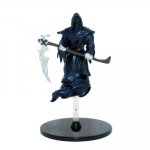Quickleaf
Legend
This is always difficult I find. If I focus fire a downed target while other PCs are alive and fighting, I might seem like a rude DM who just wants to murder. Typically I have monsters change targets once a character is down (unless he's isolated), but it does mean that PCs have an easy time helping their buddies... hmm
There any many play styles, so nothing wrong with that.
Personally, I have more fun as DM (and I *think* my players have more fun too) when I really role-play monsters uniquely so that each encounter feels unique.
For example... Carrion crawlers attempt to attack unconscious prey and drag it away down the tunnel or into the lake. Intelligent opposition like a squad of hobgoblins focus on downing active combatants before worrying about stabbing the bodies to make sure they're dead. Generally, intelligent monsters aren't going to be attacking downed PCs unless they are vicious rivals of that individual PC, are attempting to demoralize a larger force the PCs lead with a decapitation, etc.
A good example of this was in the AD&D2e Player's Handbook, where the PCs, after one of the fighters kills a wererat, discover another wererat who swears vengeance saying something like "Ignatz was my brother." In a scenario like that, you're telegraphing to attentive players that, yes, this wererat is likely to try to murder you once you're down. A little telegraphing goes a long way.


